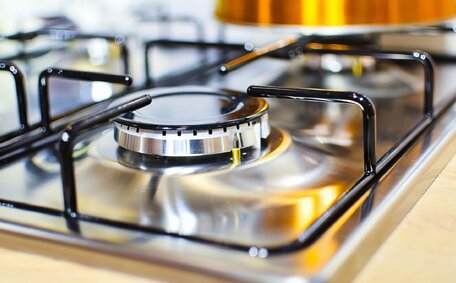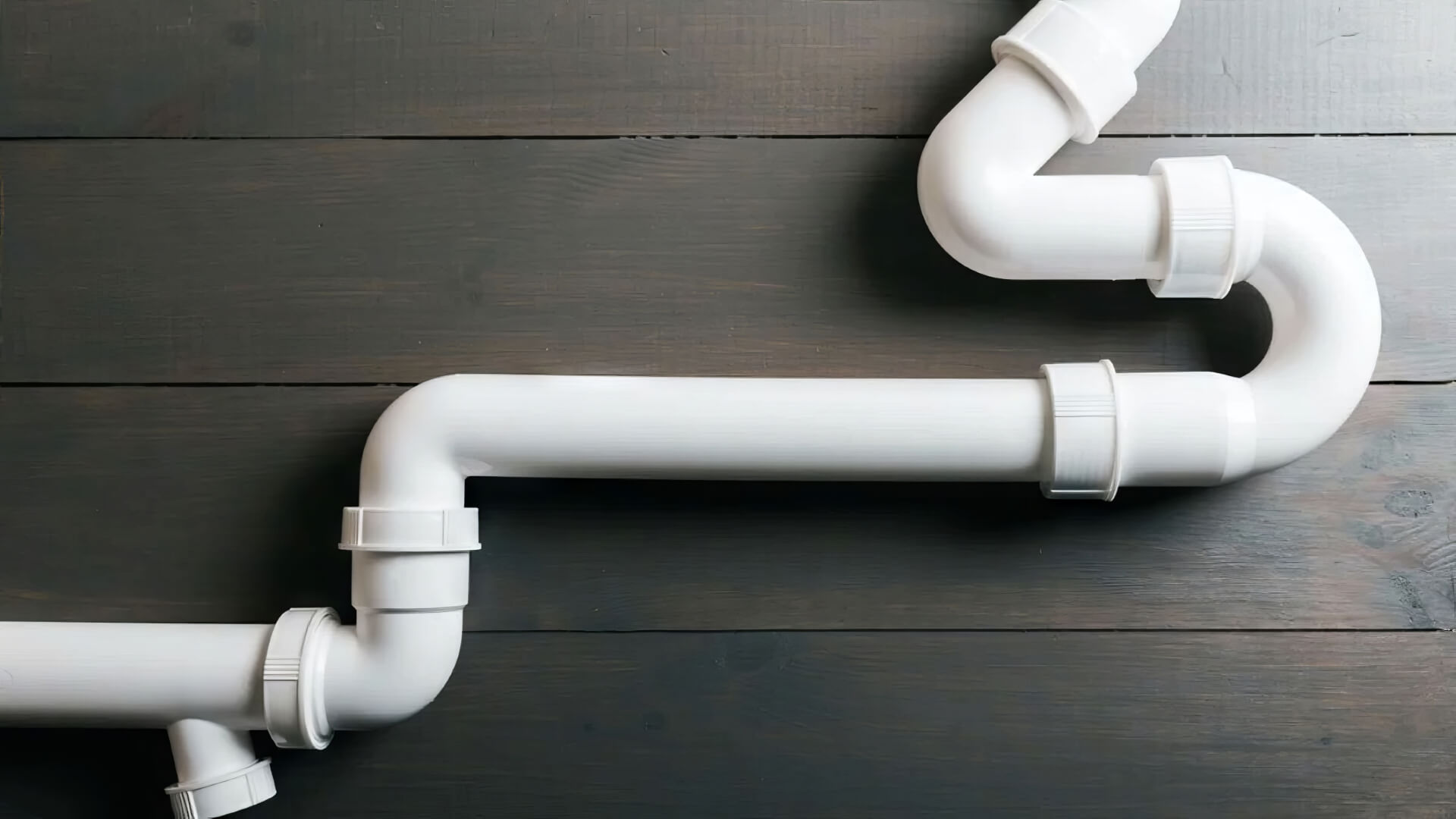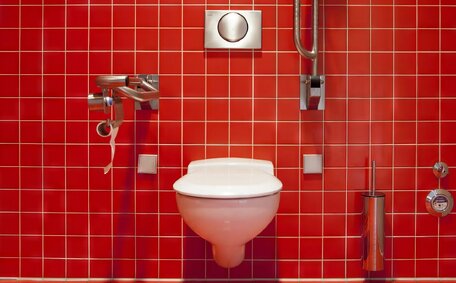Assessing why your hot water runs out quickly
Several common issues could cause your hot water heater to run out of hot water quicker than expected:
- Old age. As water heater tanks get older, they become less efficient at heating water and may not be able to keep up with demand.
- Sediment buildup. Mineral deposits and scaling can lessen your water heater’s capacity and make heating water more challenging.
- Incorrectly set thermostat. A too-high temperature setting can lead to frequent cycling of the heater and rapid drainage of hot water.
- Small tank size. Undersized hot water tanks might not hold enough water to meet a household’s needs.
- Leaky bottom tank. A leaking tank can impair water pressure and see your precious hot water come out fast when you need it most.
- High demand times, when you use hot water for activities like showering, laundry, and dishes, often strain the system.
A skilled tradesperson will check out your setup, ensuring your water can be heated efficiently and suggest solutions like flushing or replacing the tank if required. Adjusting settings or upgrading to ensure enough hot water flow and adequacy can also be beneficial.
Checking hot water system capacity and usage
To determine if your system can provide the right amount of hot water, consider if you frequently run out and follow these steps:
- Ask yourself if you’re often without hot water during peak hours. Monitor your usage consistently over 1-2 weeks, recording activities like showers, laundry, and dishwashing to pinpoint peak consumption times.
- Weigh your hot water use against your current system’s capacity. You might find that a continuous flow hot water system could suit your needs better. Tankless hot water systems provide a continuous flow, ensuring an unending supply of hot water, though they have a set maximum flow rate.
- Assess if you lack hot water during periods of high demand, which probably signifies the tank’s capacity is insufficient for your home’s needs.
- Examine your plumbing to spot any points that might be leaking water, potentially undermining your ability to supply hot water effectively. Even Small leaks can result in significant water loss over time.
- Consider adding a recirculation system, especially when water must travel a long distance from the storage tank, causing cold water in pipes.
- Consider installing a new hot water system if you’re not getting hot water when your household needs it most.
To guarantee blissful showers, size your heater correctly to ensure ample, hot water. A plumber can help ensure your water gets to the warmth expected, assessing your usage and recommending the ideal type and capacity.
Inspecting equipment issues
Regular inspection of your water heater’s internal components is critical. Signs of suboptimal hot water performance may include discoloured water or water that’s merely warm when you expect it to be hot. Leave repairs to the professionals; Only a plumber able to safely manage the intricacies of pressurised tanks and gas system components should perform repairs.
Critical components like the anode rod, heating elements, and the heat exchanger may deteriorate from corrosion or mineral clogs over time, leading to reduced hot water efficiency. Our experienced plumbers can inspect your unit thoroughly, spotting issues such as broken dip tubes, flushing sediment, and determining the need for repairs or upgrades for optimal hot water flow.
Identifying faulty heating elements
In electric water heaters, the submerged metal rods serve as the heating elements that warm the water. Symptoms of failing elements include no hot water your shower deserves, water that doesn’t heat up sufficiently, or warm but not adequately hot water. You can troubleshoot your electric hot water system safely by:
- Ensure power is reaching the system and check that no circuit breaker has tripped
- Inspect the lower heating element which does most heating. Accumulated minerals can cause your lower heating element to fail.
- Use a multimeter to check if elements provide continuity. If not, they require replacement.
- Make sure the thermostat is set correctly and working properly.
What steps can you take if basic checks fail and you still lack hot water? Your next move when issues arise may be the time to call our team for a thorough inspection. Faulty elements, if not addressed, could lead to more expensive and complicated repairs, but are fairly straightforward for a licenced technician to replace.
Checking thermostat problems
The thermostat regulates the temperature in your hot water heating system. To verify if the water reaches the desired temperature:
- To gauge temperature, turn on the hot water tap connected to your gas hot water system - it should register around 49°C.
- If the water isn’t adequately hot, reset your thermostat to a higher temperature and check again after a few minutes.
- Should the temperature remain stubbornly low, this could due to a failing thermostat that requires replacement.
- Avoid attempting repairs yourself - capsules contain toxic chemicals. Contact a licenced plumber for assistance.
Keeping your gas water heater thermostat at 49°C ensures consistent hot water availability, optimizing warmth and energy efficiency. Let the experts handle any repairs to ensure safety.
Assessing pilot light and gas issues
If you have a gas hot water system, the pilot light is crucial for heating the water. If the pilot light goes out frequently and no longer stays lit, follow these safety steps:
- Turn off the gas supply to the water heater by switching the gas valve to the 'off’ position.
- Ventilate the area by opening windows to dissipate any accumulated gas.
- Attempt to relight the pilot light by pressing the igniter button. If the pilot light goes out and doesn’t relight, don’t keep trying.
- Check to see if there’s a potential gas leak by spraying soapy water around fittings and watching for bubbles.
- If you detect a leak or need help when the pilot light goes out, secure the gas supply off position and call a professional immediately. Never leave gas systems unattended.
Our qualified local technicians are highly trained to handle pilot light issues, gas line repairs, and complete system overhauls. Trust professionals when dealing with natural gas - trying to DIY risks dangerous leaks or explosions.
Finding leaks wasting hot water
Undetected leaks in your hot water system can waste tremendous amounts of water and energy over time. Check around your water heater and connected piping for any indications of leaks such as:
- Puddles or pools of water
- Damp spots on walls or floors
- Dripping water
- Hissing sounds
Even small leaks add up and confirming you’ve got no such issues should be a priority. We advocate for an inspection by our licenced technicians who can check crucial parts like the TPR valve in your system. We can pinpoint leak locations with specialised tools, repair issues from worn washers to pinhole pipe leaks, and ensure your system is restored to peak efficiency.
Performing maintenance for efficiency
This entails operating the drain valve to empty the tank, dismounting heating elements or anode rods, and jetting water to eradicate sediment. Hire a professional licenced plumber like our team to handle this, as it requires disconnecting power and water lines.
Other easy DIY maintenance tasks include:
- Inspect pipes and fittings for leaks annually. Fix any drips immediately.
- Periodically verify water temperature and thermostat settings.
- For electric water heaters, ensure the pilot light is lit to maintain hot water availability.
- Clear up all the debris around outdoor units and intake vents.
Preventative maintenance can significantly extend your system’s lifespan. Our qualified technicians are on hand to schedule service plans designed to keep your hot water flowing reliably.
Knowing when to call a professional
Hot water systems are complex, with components that may unexpectedly run out of hot water. It can be challenging and risky to understand why your hot water levels decrease or stop if misdiagnosed.
It’s important to recognize when your hot water system requires expert attention. Well-intentioned DIY repairs could worsen issues or fail to address underlying problems. More significantly, handling complex gas or electrical equipment without proper qualifications jeopardises your safety.
Instead, leverage our team at Campbelltown Plumbing. With extensive training and local experience, we can accurately diagnose issues and recommend optimal solutions. We focus on long-term functionality, helping you decide whether to repair, replace or upgrade key components based on safety, efficiency and costs.
Don’t struggle with lukewarm showers or worry about hazards from malfunctioning heaters. Call 1300 349 338 or email [email protected], and let our licenced technicians restore abundant hot water to your home.
Preventing future hot water shortages
To prevent future hot water shortages, take the following proactive system maintenance steps:
- Carry out yearly inspections of your water heaters to identify and address leaks, corrosion, or sediment buildup early on.
- If your household’s needs exceed your current system’s capacity, consider upgrading to a larger tank or a tankless water system.
- When it’s time for a replacement, opt for a newer, energy-efficient model to reduce operating costs. Contemporary heaters have superior heat retention and might be eligible for rebates.
- Installing a recirculation system delivers hot water to your shower swiftly, eliminating the wait.
- Have professionals like our team perform annual flushes to keep the inside of your tank clean for optimal heating.
Through preventative maintenance and strategic upgrades, you can avoid the woes of a lagging hot water supply.
We encourage contacting Campbelltown Plumbing at 1300 349 338 for professional installations, repairs, and routine maintenance. Keeping your system well-maintained maximises efficiency and lifespan while preventing frustrating outages of hot water.






